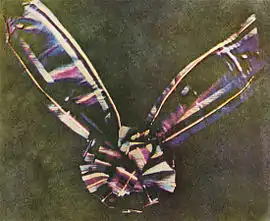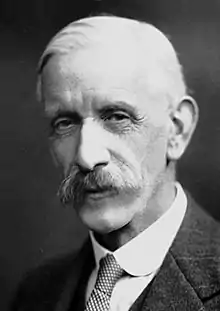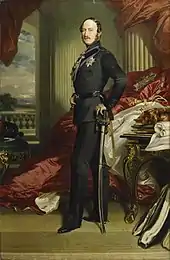1861 in the United Kingdom
Other years |
| 1860 | 1861 | 1862 | 1863 |
Sport |
Events from the year 1861 in the United Kingdom.
Incumbents
- Monarch – Victoria
- Prime Minister – Henry John Temple, 3rd Viscount Palmerston (Liberal)
- Parliament – 18th
Events
- 1 January – first steam-powered merry-go-round recorded, in Bolton.[1]
- 15 February – about 350 convicts held on St Mary's Island at Chatham Dockyard take over their prison in a riot.[2]
- 20 February – storms damage the Crystal Palace in London and cause the collapse of the steeple of Chichester Cathedral.[3]
- 21 to 26 March – major fire in Southwark destroys several buildings.[4]
- 30 March – William Crookes announces his discovery of thallium.
- 7 April – United Kingdom census. The population is more than double that of 1801.
- 12 April – American Civil War breaks out, leading to Lancashire Cotton Famine (1861–1865).
- 13 May – British government resolves to remain neutral in the American Civil War.[4]
- 17 May – Thomas Cook runs the first package holiday from London to Paris.[3]
- 31 July – Bankruptcy and Insolvency Act codifies company law.[4]
- 6 August – Criminal Law Consolidation Acts (drafted by Charles Sprengel Greaves) granted Royal Assent, generally coming into effect on 1 November. The death penalty is limited to murder, embezzlement, piracy, high treason and to acts of arson perpetrated upon docks or ammunition depots; the age of consent is codified as twelve. The Home Secretary takes over the power to reprieve or commute sentences from the judiciary and Privy Council.[5]
- Accessories and Abettors Act, codifying the law on accessories and abettors.
- Coinage Offences Act, codifying the law on counterfeiting of coins.
- Criminal Statutes Repeal Act.
- Forgery Act, codifying the law on forgery.
- Larceny Act, codifying the law on larceny and related offences.
- Malicious Damage Act, codifying the law on criminal damage.
- Offences against the Person Act, codifying the law on violent offence against the person and abortion and creating the offence of "causing bodily harm by wanton or furious driving".
- 27 August – last execution in Britain for attempted murder – Martin Doyle in Chester.
- 16 September – Post Office Savings Bank opens.[4]
- 24 October – HMS Warrior, the world's first ocean-going (all) iron-hulled armoured battleship is completed and commissioned.
- 8 November – Trent Affair: Union captained ship USS San Jacinto intercepts the British mail packet Trent at sea and removes two Confederate diplomats.[6]
- 25 November – a tenement collapses in the Old Town, Edinburgh, killing 35 with 15 survivors.
- 1 December – Trent Affair: British government dispatches its response, partly drafted by The Prince Consort.[7]
Undated

The first colour photograph by James Clerk Maxwell.
- James Clerk Maxwell demonstrates the principle of three-colour photography (see picture).[8]
- British Empire establishes bases in Lagos to stop the slave trade.
- Perpetual Truce of Peace and Friendship signed between Bahrain and the U.K.
- The Greek Orthodox Church of the Annunciation, Manchester in Salford is consecrated as the oldest purpose-built Greek Orthodox Church in England.
- Construction commences on Royal Museum in Edinburgh.
- Crimean War Memorial unveiled in London, including sculptures of Other Ranks.
- William Morris founds the influential furnishing company, Morris, Marshall, Faulkner & Co.
Publications
- Mrs Beeton's Book of Household Management.
- Charles Dickens' novel Great Expectations complete in book form.
- George Eliot's novel Silas Marner.
- F. T. Palgrave's anthology Golden Treasury of English Songs and Lyrics, 1st edition.
- Charles Reade's novel The Cloister and the Hearth.
- Anthony Trollope's novels Framley Parsonage (book form) and Orley Farm (serialisation begins).
- Mrs Henry Wood's 'sensation novel' East Lynne.
- The anthology Hymns Ancient and Modern.[9] This includes the setting "Eventide" by the music editor William Henry Monk for the hymn Abide with Me.
Births
- 22 January – Maurice Hewlett, historical novelist, poet and essayist (died 1923)
- 15 February
- Halford Mackinder, geographer (died 1947)
- Alfred North Whitehead, mathematician (died 1947)
- 19 February – Henry Horne, 1st Baron Horne, general (died 1929)
- 23 April – Edmund Allenby, 1st Viscount Allenby, soldier, administrator (died 1936)
- 12 June – William Attewell, cricketer (died 1927)
- 17 June – Sidney Jones, musical comedy composer (died 1946)
- 19 June – Douglas Haig, 1st Earl Haig, soldier (died 1928)
- 20 June – Frederick Hopkins, biochemist, recipient of the Nobel Prize for Physiology or Medicine (died 1947)
- 9 July – William Burrell, Scottish shipowner and art collector (died 1958)
- 4 August – Henry Head, neurologist (died 1940)
- 10 August – Almroth Wright, bacteriologist, immunologist (died 1947)
- 2 September – Arthur Beresford Pite, architect (died 1934)
- 23 September – Mary Elizabeth Coleridge, poet and novelist (died 1907)
- 12 October – Agnes Jekyll, née Graham, artist, writer on domestic matters and philanthropist (died 1937)
- 16 October – J. B. Bury, historian (died 1927)
- 8 November – William Price Drury, novelist, playwright and Royal Marines officer (died 1949)
- 10 November – Amy Levy, novelist and essayist (died 1889)
- 18 December – Lionel Monckton, musical comedy composer (died 1924)
- 19 December – Constance Garnett, née Black, literary translator (died 1946)
Deaths
- 29 January – Catherine Gore, novelist and dramatist (born 1799)
- 16 March – Princess Victoria of Saxe-Coburg-Saalfeld, Duchess of Kent, mother of Queen Victoria (born 1786 in Germany)
- 8 April – John Bartholomew, Sr., Scottish cartographer (born 1805)
- 13 June – Henry Gray, anatomist (smallpox) (born 1827)
- 18 June – Eaton Hodgkinson, structural engineer (born 1789)
- 29 June – Elizabeth Barrett Browning, poet (born 1806)
- 6 July – Sir Francis Palgrave, historian (born 1788)
- 4 October – Archibald Montgomerie, 13th Earl of Eglinton, noble (born 1812)
- 13 October – Sir William Cubitt, civil engineer (born 1785)
- 21 October – Edward Dickinson Baker, United States Senator from Oregon, 1860–1861 (born 1811 in the U.K.)
- 13 November
- Arthur Hugh Clough, poet (born 1819)
- John Forbes, royal physician (born 1787)
- 10 December – Thomas Southwood Smith, physician and sanitary reformer (born 1788)
- 14 December – Albert, Prince Consort, spouse of Queen Victoria (born 1819 in Germany)
See also
References
- "Fairground Rides - A Chronological Development". National Fairground Archive. University of Sheffield. 2007. Archived from the original on 11 August 2011. Retrieved 24 August 2011.
- Hastings, Paul; Coulson, Ian. "Life in Kent Gaols before 1877". Here's History Kent. Archived from the original on 26 February 2012. Retrieved 24 August 2011.
- Penguin Pocket On This Day. Penguin Reference Library. 2006. ISBN 0-14-102715-0.
- Palmer, Alan; Veronica (1992). The Chronology of British History. London: Century Ltd. pp. 282–283. ISBN 0-7126-5616-2.
- "Timeline of capital punishment in Britain". Retrieved 2 February 2011.
- Fairfax, D. Macneil (1885). "Captain Wilkes's Seizure of Mason and Slidell". In Johnson, Robert Underwood; Buel, Clarence Clough (eds.). Battles and Leaders of the Civil War: North to Antietam. pp. 136–9.
- Ferris, Norman B. (1977). The Trent Affair: a Diplomatic Crisis. pp. 52–53. ISBN 0-87049-169-5.
- The Hutchinson Factfinder. Helicon. 1999. ISBN 1-85986-000-1.
- "A History of Hymns Ancient & Modern Ltd". SCM-Canterbury Press. Archived from the original on 5 December 2008. Retrieved 3 January 2011.
See also
This article is issued from Wikipedia. The text is licensed under Creative Commons - Attribution - Sharealike. Additional terms may apply for the media files.

